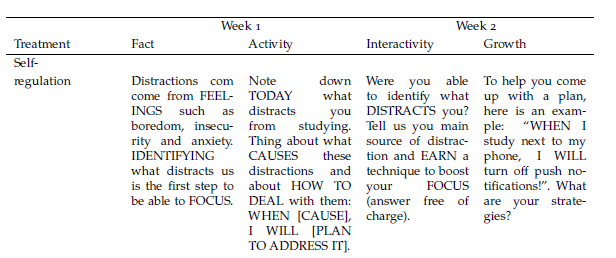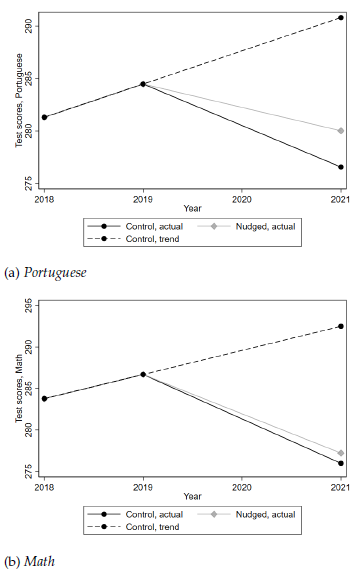Neglecting students' socio-emotional skills magnified learning losses during the pandemic
Published in Behavioural Sciences & Psychology and Education
When schools had to close down all over the world amidst the emerging threat of COVID-19, back in 2020, educational systems went all in to adapt instruction from in-person to remote. That happened through a combination of different technologies -- from radio or phone instruction, in low-income settings such as Sub-Saharan Africa, to TV broadcasts and online learning management systems, in middle-income settings such as Latin America. That was precisely the case in Brazil, the setting of our study.
While the successful transition to remote learning seems to have been important to prevent student dropouts during the pandemic, in most low- and middle-income countries average learning losses were nothing short of catastrophic -- despite all efforts by school systems, teachers, students and their families amidst such challenging conditions. The main strategy to cut losses short was simply to resume in-person classes as early as possible.
In retrospect, however, there was more available to schools than simply adapting the curriculum to new instruction formats. The key insight lies in realizing that in-person classes do a lot more than simply imparting knowledge from teachers to students. Being part of a classroom tends to foster a sense of belonging, receiving positive feedback from teachers and peers tends to boost one's motivation to put in effort at school activities, and negative feedback, when delivered constructively, can promote a growth mindset and stimulate the ability to self-regulate emotions.
Research shows that students' mental health and socio-emotional skills were also hurt throughout the pandemic. Such impacts matter in and of themselves, but also because of their intricate connections to learning in and out of school. The ability to regulate emotions and navigate complex contextual changes are at the core of students’ learning experiences, particularly during adolescence. Neurobiological changes during puberty redirect adolescents’ attention and motivational salience, with status-seeking behaviors, romantic interests and peer pressure often getting in the way of attending classes. As a result, adolescents are the ones most likely to engage less with studies, and even to ultimately abandon school.
Consistent with these neurobiological mechanisms, socio-emotional skills had been previously shown to be key predictors of learning during in-person classes: grit, self-regulation, motivation, and a growth mindset, all have been linked to better educational outcomes, both in observational and experimental studies.
As such, it is natural to hypothesize, on the one hand, that the worsening of students’ socio-emotional skills might have magnified learning losses during remote learning; in effect, motivation, grit, self-regulation and a growth mindset might be even more important without the structure provided by in-person classes and without adequate conditions to focus on academic activities. On the other hand, these skills might actually have played a less prominent role during remote learning, in the absence of face-to-face interactions, social pressure and other sources of motivational salience that often detract from learning, especially during adolescence.
Which force dominated during the pandemic? Providing a causal answer to this question is challenging. The evidence that both socio-emotional skills and learning outcomes deteriorated during remote learning is not sufficient (and not even necessary) to establish causality.
Providing a causal answer this question is also important. Despite concerted efforts to adapt the curriculum to the new circumstances and instruction to new media, students’ socio-emotional skills were largely overlooked during the emergency transition to remote learning. Worse still, even in the aftermath of the pandemic, it remains the case that remedial policies prioritized by low- and middle-income countries are largely focused on curricular content; in Brazil, a nationally representative in the aftermath of the pandemic found that 60% of students were enrolled in schools that did not offer resources for psychological support.
In a paper just published in npj Science of Learning, we evaluate an intervention that sent behavioral nudges twice a week over text messages (SMS) to public school students enrolled in grades 10 − 12, typically aged 15 − 18 years old, or their primary caregivers, in the State of Goiás, Brazil. Nudges consisted of encouragement messages sent twice a week, organized in thematic sequences of four messages, with a new sequence starting every other week. Nudges targeted students’ socio-emotional skills; in particular, messages tried to motivate students to stay engaged with school activities during remote learning, to support them in regulating negative emotions, to foster a growth mindset, and to develop grit.

In total, 12,056 high-school students across 57 public schools received SMS nudges, while 6,200 high-school students across 30 public schools received no nudges or other text messages from their schools over that period.
Based on the State's standardized tests over the years in the State, high-school senior students’ average proficiency backtracked 2.84 years in math and 2.25 years in Portuguese in the absence of in-person classes. We find that the intervention significantly increased standardized test scores relative to the control group, preventing 7.5% of learning losses in math and 24% in Portuguese.

The study further documents that such effects do not conflate changes in students' composition due to the effects of the intervention on student dropouts during remote learning. Importantly, it also shows that they do not merely experimenter demand effects – e.g., in case text messages merely increased the salience of school activities, led students to infer social expectations about school effort, or led teachers to exert higher effort in schools targeted by the intervention –, thanks to the fact that, within the treatment group, the specific script of the intervention was randomly assigned at the student level (unbeknownst to teachers). Taking advantage of that additional experiment, we show that the content of the text messages ultimately matters. All in all, results are consistent with the hypothesis that neglecting students’ socio-emotional skills magnified learning losses during the pandemic.
The largest effects of the intervention were concentrated in the upper half of the proficiency distribution, and in schools that already featured online academic activities prior to the pandemic. Together, those findings are consistent with the claim that curricular content and socio-emotional skills are complements for effective learning. They also indicate that effective remote learning activities might be necessary -– even if clearly insufficient — to keep all students engaged and motivated to return to in-person classes when the conditions allow.
Our findings provide important lessons to address the global education crisis in the context of the pandemic. Beyond focusing on curricular knowledge to address learning deficits, public school systems should reach out to families to provide support and encouragement during challenging times. While having school staff adequately trained to handle students’ emotional and psychological needs would be ideal, the limited supply of trained specialists and the budget constraints of public school systems in middle- and low-income countries often make such ideal unattainable. As such, simple technologies such as text messages can help partially achieve that goal, under much lower complexity and costs. At a minimum, that approach can complement the work of school counselors, and ensure that students remain supported even when the latter are not available.
Even though in-person classes are now back all over the world, accumulated learning losses are still sizeable, and recent evidence from Brazil suggests that neglecting students’ socio-emotional skills continues to play a role – this time, dramatically holding back the speed of learning recovery. In effect, recent research documents that SMS nudges targeting socio-emotional skills were the most effective intervention to boost learning recovery among a wide range of remedial policies in São Paulo, Brazil, doubling recovery rates relative to the State average.
Nonetheless, socio-emotional needs might vary widely across settings, before, during and after the pandemic. If the impacts of SMS nudges on students’ educational outcomes extend to other settings, then not only would researchers learn about the extent to which our findings can be generalized, but also, policy-makers would have a more solid evidence base to more confidently (and more quickly) incorporate socio-emotional communication with students in their educational policy toolkit. As such, this remains an important avenue for future research.
Follow the Topic
-
npj Science of Learning

An online open access peer-reviewed journal dedicated to research on all aspects of learning and memory – from the genetic, cellular and molecular basis, to understanding how children and adults learn through experience and formal educational practices.
Related Collections
With Collections, you can get published faster and increase your visibility.
Effects of lifestyle behaviours on learning and neuroplasticity
Publishing Model: Open Access
Deadline: Mar 09, 2026
Reimagining Teaching and Learning in the Age of Generative AI Agents
Publishing Model: Open Access
Deadline: Jul 13, 2026





Please sign in or register for FREE
If you are a registered user on Research Communities by Springer Nature, please sign in